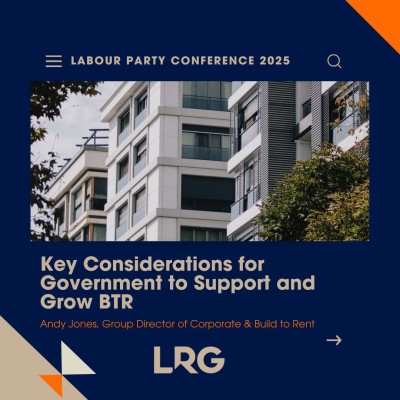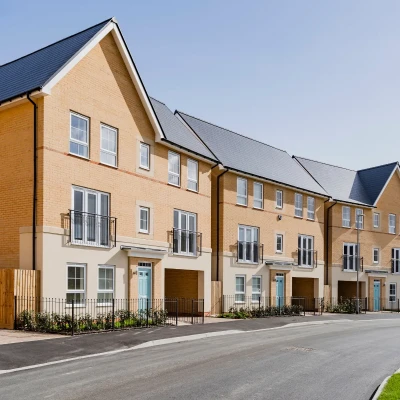Priorities for the Secretary of State for Levelling Up Housing and Communities

The two most pressing concerns for Michael Gove as he resumes his role as Secretary of State for levelling up are the housing crisis and the climate crisis.
With the potential to deliver new homes at speed and in the context of sustainable development, BTR suburban communities should be high on the Secretary of State’s agenda, and not just in sentiment but implementation. As recent political events have shown, commitment to an ideology is just the start; action is everything. To roll-out BTR suburban communities in line with rising demand requires the Secretary of State to address several outstanding issues.
Housing targets
The first is housing targets. Large-scale new settlements can only progress through the planning system if local authorities have an obligation to provide them: in the absence of a specific target, many councils, typically those in areas of greatest housing need, will resist new development under pressure from local ‘NIMBYs’. In an interview with the Sunday Telegraph in May, Gove indicated that he would withdraw housing targets, stating that the Government's ‘abstract’ target should not be the ‘sole measure of the success’. Admittedly, in the same interview, Gove stated that ‘removing the Prime Minister now would be bonkerooney'. Two PMs on, there is hope that Gove will alter his opinion on housing targets, just as he did his commitment to Boris Johnson.
Bias towards brownfield land
Increasingly, planning policy favours urban brownfield developments which utilise otherwise redundant sites and revitalise high streets. BTR suburban communities, which because of their size will need to utilise greenfield land alongside brownfield. The Secretary of State must understand that the delivery of sustainable, accessible and inclusive communities will in some cases require the use of greenfield, and in some cases the thorny issue of Green Belt release, and adapt policies accordingly.
A policy vacuum
Although 45% of all English local authorities now include Build to Rent schemes, there is a stark absence of specific policies within Local Plans. There are many aspects of BTR development, such as houses sizes, parking and the provision of district heating systems which, because they apply differently in BTR and BTS sectors, would benefit from more tailored polices. The Levelling Up and Regeneration Act is set to require that Local Plans are ‘streamlined’ and with many local authorities already taking this approach prior to the Bill being enacted, it seems unlikely that future Local Plans will make specific reference to Build to Rent.
However, it was announced in June that a new suite of National Development Management Policies would be introduced to exist alongside the National Planning Policy Framework (NPPF), to which all Local Plans must refer. This has potential to fill the policy vacuum and allow BTR suburban communities to compete evenly with more established development typologies. We encourage the new Secretary of State to bring this forward as a priority, to reduce the obfuscation and delay that currently exists at a local level.
Renters Reform Bill
Another significant policy initiative, still awaited, is the Renters Reform Bill. In June the Government published its Fairer Renting White Paper and in September to October consulted upon its policy document A Decent Homes Standard in the private rented sector. Both documents set out the Government’s commitment to introduce a legally binding Decent Homes Standard to the PRS through primary legislation and to improve parity with the social rented sector, where there has been a decent homes standard in place since 2001. We fully support the Government’s plans to ‘professionalise’ the sector raise standards, especially in the small minority of cases where standards are inadequate.
But it is very important that in introducing major reforms, the Government does not penalise the vast majority of landlords who are already operating honestly and responsively, in what can be a very difficult market - especially in view of rising interest rates, increased regulations and concerns about a potential recession.
With a maximum of two years remaining in this parliamentary term, time is running out for the policies to be enacted: Michael Gove must make this a top priority.
Minister for Renting
This then raises the question, should Gove put in place a specific Minister for Renting, as has been called upon?
Our view is that initiatives to tackle the serious problem of ‘rouge landlords’ are welcome – albeit accepting that these represent only a small percentage of landlords (not all of them amateur landlords). But is a Minister the best way to achieve this? As recent political events have demonstrated, politics can be short-term, unstable and too easily influenced by external factors. Higher standards in the PRS can, and are, achieved, through bodies including ARLA, RICS, the IRPM, the BPF or a specifically created ombudsman, the PRS is steadily improving standards through self-regulation. The PRS does require stability, but that may be better achieved outside of politics.
Conclusion
In terms of addressing housing need and sustainability, Michael Gove should be proud of what BTR suburban communities have already achieved under his watch. Furthermore, BTR suburban communities are also in sync with evolving priorities including ‘building beautiful’, the concept of the 15-minute neighbourhood, and introducing many values that have been lacking in the PRS previously.
It is unfortunate and we believe somewhat short sighted that Michael Gove has spoken out so strongly in favour of home ownership in contrast to continued support and focused efforts for the meteoric growth of the PRS. BTR suburban communities have the potential to deliver what an increasingly large proportion of the country needs and wants. We look forward to convincing him of the value of Build to Rent, specially its evolution into BTR suburban communities, and influencing the Government in shaping policy accordingly.

Contact Us
Got a question, general enquiry or something else?
You may also like
Since we started in 1987 we have grown to one of the UK’s largest property groups, we can save you time and money by offering a range of services and expertise under one roof.



